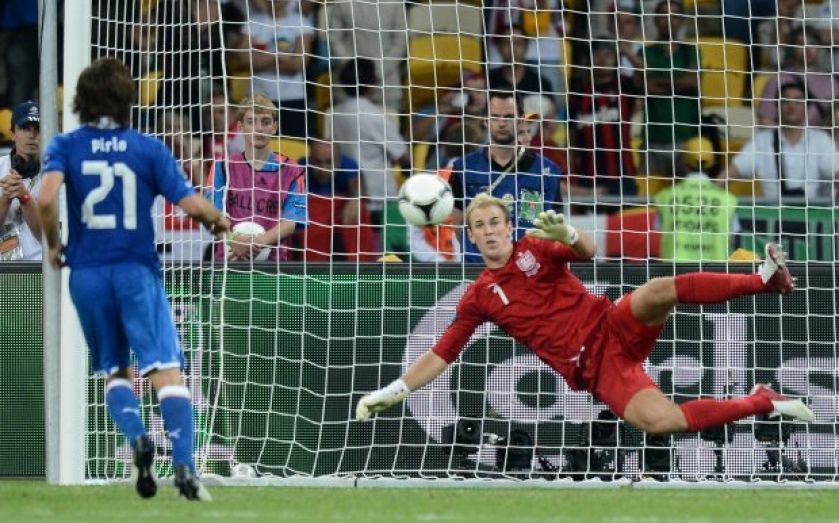World Cup penalties: Less luck, more psychology

The lottery of the penalty shoot-out.
It’s unlikely that you will go the next month without hearing that phrase, but to what extent is this oft-repeated football cliche actually true?
Is luck really a factor?
Taking a look at the data, luck only really comes into it in during the coin toss to decide who goes first.
The last seven World Cup shoot-outs have been won by the team going first. According to figures collected by journalist and author Ben Lyttleton for his book 'Twelve Yards', the team taking the first penalty has a greater record of progressing.
In the Champions League and domestic cups this figure is above 60 per cent and in the World Cup it is just below on 59 per cent.
Data published from Twelve Yards with permission
Beyond that, the real issue is dealing with pressure.
Looking at the 204 penalties taken since shoot-outs were introduced in 1978, a penalty taker whose side would win the game if he scored did so 93 per cent of the time, but only 44 per cent scored if missing would have led to elimination.
The difference is less pronounced when taking penalty shoot-outs in all competitions into account, where 62 per cent of penalties find the net when scoring is necessary to stay in the game.
While part of this could be due to the small sample size of World Cup penalty shoot-outs, it potentially underlines the level of pressure players are under when stepping up to take a kick for their country at the most global of stages.
This is also supported by the conversion rate in general. The bigger the stage, the harder it seems to be. The conversion rate for penalties is around 78 per cent according to Lyttleton's research, but for the World Cup that figure drops to 71 per cent.
And this is essentially what does it for England players, however much they practice.
The statistic that will strike fear into the hearts of England fans should they make it through the group stages of the competition in Brazil?
England really are the worst at World Cup penalties, having lost all three of their shoot-outs so far, scoring in just seven of 14 attempts. Mexico are actually bottom of the pile when it comes to the conversion rate, having scored just two of seven, but have only been involved in a shoot-out twice.
While Italy don't fare too well either – they lost as many shoot-outs and failed to score as many penalties as England, but they have won a World Cup final on penalties, which must count for something in terms of confidence at least. What makes this worse is that England players are actually very good from the spot.
Just not at the World Cup. According to Lyttleton, English players are among the best in the world until they put on the Three Lions jersey.
"There is this myth that English players are bad at penalties. That is simply not true. When these players play for their clubs, English players are the best in the world at taking penalties. Players like Gerrard, Lampard, Baines and Lambert are very prolific from the spot in club football," he told City AM.
"It looks like something happens to the psychology and mindset of the England players when they play for their country and they have this huge weight, this negative baggage behind them."
The way English players take penalties may say a lot about how confident they are.
Analysing Lyttleton's figures, England players come out top in avoidance looking – turning their backs on the goalkeeper after placing the ball on the spot. They also are the fastest at taking penalties, with a response time of just 0.28 seconds, compared to almost one second for France. German players on average take 0.64.
Data published from Twelve Yards with permission, copyright © Jordet,G.
According to psychologist Geir Jordet who has published research on penaties "fast preparation times are thought to reflect a desire to escape the situation by getting their shots over and done with quickly".
What about the Germans? Do they really never miss from the spot?
They are by far the most composed at the World Cup when the stakes are high and they're playing for their country, having missed just one of 18 total attempts from the spot.
"Commentators will always say that German players are so good at penalties but they're not. If you think of Mesut Ozil this season at Arsenal he missed penalties in two Champions League games, Thomas Muller missed in a Champions League game and Schweinsteiger in a final against Chelsea," Lyttleton adds.
The question is, can English players somehow ignore the pressure and emulate their club form from twelve yards?
Perhaps the best option for the nation's heart rate would be not having to find out the answer at all.
Twelve Yards: The Art and Psychology of the Perfect Penalty (Bantam Press) by Ben Lyttleton is out now